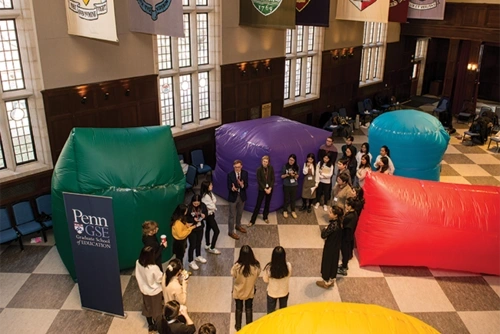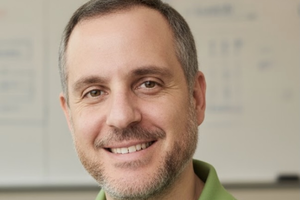One Friday this February in Penn’s Houston Hall, five teams of Penn GSE students discussed roles, responsibilities, and geometric forms as they prepared for life 34 million miles away on Mars. But the program they were launching wasn’t a space travel initiative—it was a series of professional development workshops for Penn GSE students, produced by the School’s new Center for Professional Learning. The first workshop gave students the opportunity to learn about the teaching approach of project-based learning. By working together to design human habitats for Mars, participants prepared to guide their own students through similar projects that draw upon real-world problems to impart skills in teamwork, collaboration, design, mathematics, and other areas.
The Center is poised to bring the School’s groundbreaking research and practice to the world on a larger scale. Its dynamic new offerings will allow working professionals—alumni, educators, leaders, scholars, policy makers, entrepreneurs, and others—to deepen their knowledge, build their professional networks, and grow their careers. The Center’s upcoming series of Virtual Summer Institutes (see below) and a slate of online courses to be released later this year are all geared to the needs of nondegree students, or “learners.”
Penn GSE has long offered professional development for educators and leaders who want to expand their skill sets and apply best practices in their schools, institutions, and organizations but may not have the time or resources to enroll in a degree program. For decades, the Center for School Study Councils, the Philadelphia Writing Project, and the Penn Literacy Network have provided learning opportunities for working educators. In recent years, the School has established nondegree programs to address emerging needs in the field of education—education innovation, virtual online teaching, applied computational thinking, and project-based learning. Now, the Center is undertaking a bold expansion of this work.
“One of our goals is to make learning opportunities through Penn more accessible,” says Dr. Zachary Herrmann, inaugural executive director of the Center and director of the Project-Based Learning Certificate Program. “One way to do that is to create programs that aren’t degree programs, but still allow you to engage with Penn faculty and the Penn community in a learning experience. While Penn GSE has offered some professional learning opportunities like these, there’s tremendous potential to do far more, reaching a much broader audience of learners both here in Philadelphia and across the globe.”
Newly established within Catalyst @ Penn GSE, the School’s hub for innovation, the Center launched a series of one-day “deep dive” workshops this spring for Penn GSE students, beginning with the workshop on project-based learning. It asked participants to tackle a challenge currently being undertaken by scientists, engineers, designers, and others—how to sustain human life on the Red Planet. Having taken on roles such as quality-control specialist, project manager, and documentation specialist, team members designed three-dimensional habitat shapes and then constructed and inflated them using colorful plastic. Inflatables are currently an option on the table as scientists consider how to sustain human life on Mars with lightweight, transportable materials.

The workshop’s content was drawn from the curriculum of the School’s Project-Based Learning Certificate Program. Similarly, the Center is drawing on the knowledge of Penn GSE faculty—whose expertise spans preK–12 education, higher education, and learning in the workplace—to create new learning opportunities for an array of working professionals. For Penn GSE alumni, that will mean increased possibilities for lifelong learning through their alma mater.
“The Center will focus on leveraging the incredible expertise in our school to develop and support professional learning opportunities for a wide audience of scholars and practitioners,” says Penn GSE Dean Pam Grossman. “It is a result of recommendations by faculty and staff regarding how best to grow the School’s impact and share more broadly relevant research and knowledge.”
“We’re creating more ways for educators to stay current with best practices and cutting-edge research, to continue to interact with the Penn community, and to gain the education they need to advance in their careers,” says Herrmann.
No matter the topic, the institutes and classes will build community among professionals as they learn how ideas can be applied on the ground for schools, colleges, businesses, nonprofits, and other settings.
“Our mission has three components,” says Herrmann. “The first is to deepen knowledge—people are coming to us to learn from the Penn community. The second is to build networks—participants will interact with other practitioners from across the country and around the world to build relationships that last well beyond their time in the program. And the third is to grow careers, so that participants will gain the skills and knowledge to take the next step in their professional trajectories.”
2020 Virtual Summer Institutes
June
Collaboration and Conflict: Leading Highly Effective Teams with Dr. Zachary Herrmann
July
New School Models Design Lab with Dr. Tyler Thigpen
August
Teaching Document-Based History with Dr. Abby Reisman
Teaching Math Responsively: Number Talks and Math Routines with Dr. Caroline Ebby and Dr. Janine Remillard
Visit www.gse.upenn.edu/academics/professional-learning or contact professionallearning@gse.upenn.edu to learn more.
This article appeared in the Spring 2020 issue of The Penn GSE Magazine.
Media Inquiries
Penn GSE Communications is here to help reporters connect with the education experts they need.








